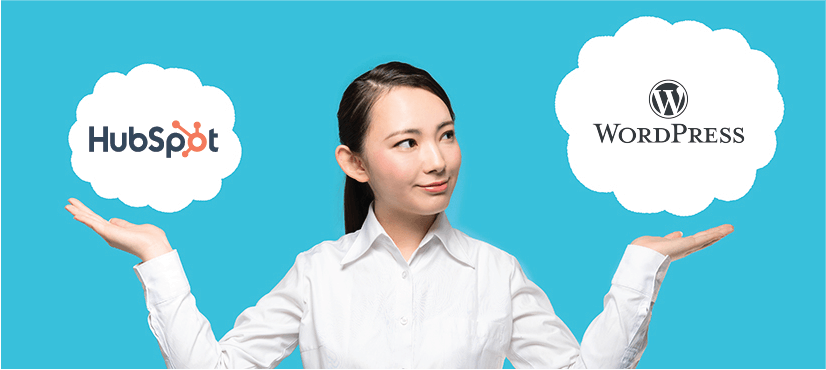HubSpot vs WordPress: Which CMS Is Right for Your B2B Website?

If you’re planning a website redesign for your B2B company, you’ve probably found yourself asking this question: Should we build our website on HubSpot CMS or WordPress CMS?
It’s a question we hear all the time. And over the past few years, we’ve noticed a clear trend: More and more of our clients are choosing to migrate their B2B websites from WordPress to HubSpot.
That shift is no accident. It’s driven by changes in technology, business needs, and a growing desire for marketing teams to gain more control over their websites without relying on developers to make every small change.
To help you make the right decision for your business, I spoke with Fabio Munoz, CEO of Epic Digital, a longtime design and development partner of Clariant Creative. I also asked for input from my LinkedIn network of marketers, developers, and agency leaders. The result is a comprehensive, real-world look at how these two platforms compare, to help you determine which one might be the better fit for your organization.
Comparing Two Popular CMS Platforms for B2B Companies
Let’s start with a quick overview of each CMS:
HubSpot CMS
- Built on the same platform as HubSpot’s CRM, marketing, and sales tools
- Offers a secure, fully hosted solution with drag-and-drop editing
- Is ideal for marketing and sales alignment, lead tracking, and integrated reporting
- Offers monthly and annual subscription models with tiered features
WordPress CMS
- Open-source CMS with near-unlimited customization options
- Requires separate hosting, plugins, and (often) development support
- Popular for its flexibility and low upfront costs
- Powers more than 40% of all websites globally
Fabio summed up the core difference like this: “WordPress is super flexible — for good and for bad. You can build almost anything, but if you don't manage it well, it becomes a problem.”
Key Decision Factors for B2B Marketers
 1. Ease of Use
1. Ease of Use
If you’re part of a lean marketing team, ease of use matters. A lot.
WordPress is known for its user-friendliness — particularly if it’s built with the right theme and plugins. Many themes now offer visual editors that enable an easy drag-and-drop page-building experience. The market for themes is extensive, meaning you can quickly set up almost any type of design you might want. Need something more custom? The market for WordPress designers/developers is equally extensive.
Even so, chances are a developer won’t always be needed. As Tracy Graziani, CEO of Graziani Multimedia, pointed out to me on LinkedIn: “HubSpot's theme architecture is kind of frustrating. There are very popular WordPress builders that are more designer-friendly and easier to work with without needing to lean on a developer.”
HubSpot similarly offers a clean, unified interface with drag-and-drop modules that make it easy to edit pages without knowing code. You can publish new pages, update CTAs, or spin up landing pages on the fly. HubSpot also includes built-in staging and version history features that help marketers safely update content without breaking live pages.
Fabio emphasized how much the platform has improved in this regard: “HubSpot’s design tools have come a long way. The drag-and-drop builder is now very comparable to Elementor or other WordPress tools. For most B2B websites, the design experience is virtually identical.”
 2. Security & Maintenance
2. Security & Maintenance
This is where the platforms really diverge.
HubSpot is fully hosted, which means all updates, patches, and security protocols are handled for you. There’s no need to monitor plugins or worry about PHP version conflicts. Two-factor authentication, SSL, and CDN support come standard – as does 24/7 support, so when something breaks, you’re not on your own in a plugin forum.
WordPress, on the other hand, is open source. While this gives you flexibility, it also puts security and maintenance in your hands. If you don’t have a developer or an agency actively maintaining your site, you’re at risk.
“If you are worried about how your brand can be impacted by phishing or scams, you should not use WordPress,” said Fabio. “The problem isn't just WordPress — it's that you're managing a system where every plugin is another potential vulnerability.”
 3. SEO & Site Performance
3. SEO & Site Performance
Let’s bust a myth: WordPress is not automatically better for SEO.
Yes, WordPress has powerful SEO plugins like Yoast and Rank Math. But those tools are only helpful if they’re used correctly. If your team doesn’t understand on-page SEO or schema markup, the plugin can’t do the work for you.
HubSpot’s CMS, by contrast, includes built-in SEO tools that guide you as you optimize content. Start building a web page or blog post, and HubSpot will prompt you with real-time suggestions for metadata, headings, image alt text, and more.
“They always say WordPress works good with SEO,” said Fabio. “But most of the time, they don't know how SEO works. You can do great SEO with either platform — but HubSpot makes it easier for the average marketer.”
Related Content: Free SEO Toolkit
 4. Analytics & Data Visibility
4. Analytics & Data Visibility
Reporting is one of the most compelling reasons to choose HubSpot.
HubSpot allows you to track a visitor’s entire journey, from first touch to form fill to customer. You can see exactly which blog post they read, which email they opened, and which website pages they viewed — all tied to a known contact record. Additionally, HubSpot enables “smart content” that dynamically personalizes a content module based on your CRM data, such as lifecycle stage, persona, or behavior.
WordPress doesn’t offer native analytics. You’ll need to install Google Analytics, which is powerful, yes, but requires extensive manual setup. Google Analytics also lacks the native ability to tie specific website activity to specific visitors, unless you integrate it with your CRM.
“Every time we build a site, we set up both HubSpot and Google Analytics,” Fabio said. “Google Analytics is great for ad performance and demographics. But if you want to understand how leads are actually converting, HubSpot wins hands down.”
Related Content: Essential HubSpot Dashboards
 5. Design & Development Flexibility
5. Design & Development Flexibility
Here, WordPress has the edge — but that’s not always a good thing.
With tens of thousands of themes and plugins available, you can build almost anything in WordPress. From e-commerce to membership sites to job boards, the sky’s the limit.
But that flexibility can create problems. Too many plugins can introduce conflicts or slow your site down. And if a plugin is abandoned by its developer, you’re left scrambling for a fix.
HubSpot offers fewer templates overall, but the available themes are clean, modern, and easy to work with. And as Fabio noted earlier, the design experience in HubSpot now rivals what marketers are used to in WordPress page builders.
 6. Cost & Total Cost of Ownership
6. Cost & Total Cost of Ownership
WordPress is often perceived as the cheaper option, and at first glance, that’s true. It’s free to install, and hosting can cost as little as a few dollars a month.
But the costs can add up as you factor in
- Premium themes
- Paid plugins
- Developer hours for setup, customization, and troubleshooting
- Ongoing maintenance and security updates
In contrast, a Content Hub subscription in HubSpot starts at $25/month with the Starter tier and scales up from there. Yes, you’re paying more upfront, but you also gain more functionality: built-in security, SEO, hosting, analytics, forms, reporting, and support. You’re also not stitching together tools; your CRM, email, landing pages, and analytics are natively integrated – reducing tech sprawl, administrative headaches, and vendor costs.
Ultimately, as a marketer you need to make the decision that’s right for your organization. As Tracy shared, “There are a lot of reasons to build on HubSpot, and we encourage it more now than we used to. That said, there are still times when WordPress makes sense, too.”
HubSpot vs WordPress: Real-World Use Cases
Here’s where each platform tends to make the most sense:
Choose WordPress if:
- You need full control over every aspect of your site.
- Your site requires complex or highly custom functionality.
- You have an in-house developer or a trusted WordPress agency.
- You’re building a microsite with a finite lifespan or for a very specific purpose.
Tracy offered a helpful example here: “Right now, we're planning on a short-term microsite for a specific joint venture. It doesn't make sense to commit to a HubSpot license, because those are a yearlong commitment.”
Choose HubSpot if:
- You already use HubSpot as your CRM or marketing platform.
- Your team wants to move quickly and avoid the need for ongoing technical maintenance.
- Security, performance, and scalability are priorities.
- You want end-to-end visibility from traffic to lead to sale.
- You want a platform that can scale with your business as it grows – from simple landing pages to multi-language, multi-domain enterprise websites.
Common CMS Misconceptions
Let’s clear up a few lingering myths about HubSpot vs WordPress:
- "WordPress is better for SEO." Not necessarily. SEO depends more on content quality, architecture, and strategy than platform choice.
- "HubSpot CMS is too expensive." HubSpot now offers affordable tiers starting at $25/month. And what you save in time, plugins, and dev costs often outweighs the monthly fee.
- "You can’t customize HubSpot." That used to be true. But HubSpot’s CMS Hub has matured significantly. Skilled developers can now create highly custom experiences on the platform.
Expert Advice for Choosing the Right Platform
Fabio said it best: “If you’re building your site in isolation, maybe WordPress is fine. But most companies aren’t doing that. They need landing pages, email automation, CRM visibility, and lead capture — all connected. That’s where HubSpot shines.”
He also added: “At some point, you will need data from your CRM. So why not build your website directly on the same platform as the CRM you’re already using?”
If you're still unsure, ask yourself:
- Do we have the in-house resources to manage WordPress securely and efficiently?
- Do we want to spend more time marketing, or more time managing plugins and updates?
- How important is contact-level data to our marketing strategy?
 Planning to Migrate from WordPress to HubSpot CMS? Read This First.
Planning to Migrate from WordPress to HubSpot CMS? Read This First.
A poorly executed website migration can hurt your search rankings, but it doesn’t have to. Here are six key factors to keep in mind:
- Redirect every URL thoughtfully: Build a complete 301 redirect map to preserve SEO equity and avoid broken links.
- Preserve and reapply SEO metadata: Migrate or manually re-enter meta titles, descriptions, headings, alt text, and canonical tags.
- Update internal links: Make sure all links point to the correct new HubSpot URLs.
- Protect high-value content: Don’t delete or merge SEO-performing pages without a clear content strategy.
- Test forms, CTAs, and tracking: Rebuild and QA conversion paths, and ensure analytics are functioning.
- Monitor post-launch performance: Watch traffic, rankings, and crawl errors closely after launch.
When done right, migrating to HubSpot can actually strengthen your SEO and make your team’s life easier in the long run.
Final Thoughts
There’s no one-size-fits-all answer to the CMS debate. WordPress and HubSpot both have their strengths. The right platform for your business depends on your goals, your tech stack, your internal resources, and your appetite for maintenance.
But if you’re tired of babysitting plugins, struggling with analytics, or wishing your website worked more closely with your marketing and sales tools, it might be time to consider HubSpot.





